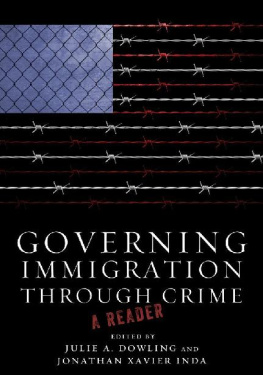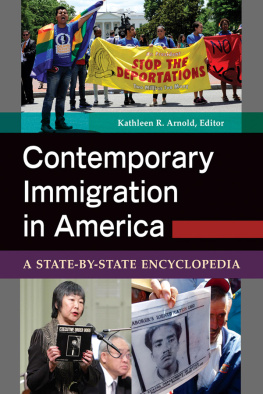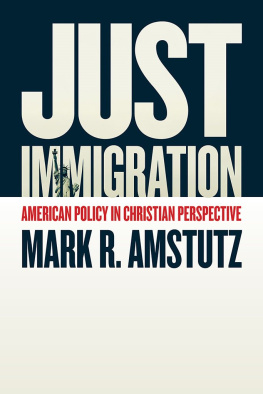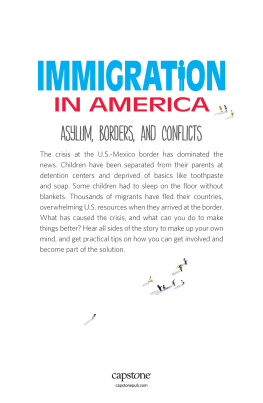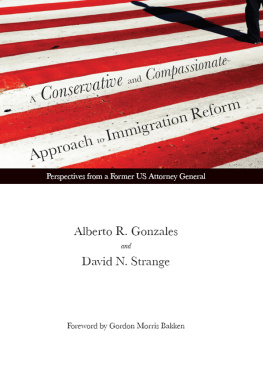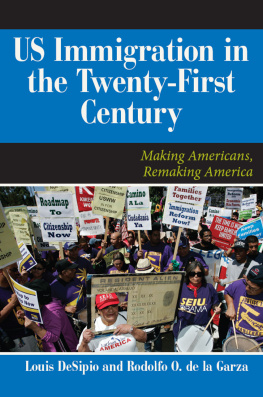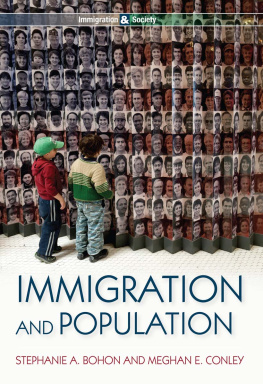Stanford University Press
Stanford, California
2013 by the Board of Trustees of the Leland Stanford Junior University. All rights reserved.
No part of this book may be reproduced or transmitted in any form or by any means, electronic or mechanical, including photocopying and recording, or in any information storage or retrieval system without the prior written permission of Stanford University Press.
Printed in the United States of America on acid-free, archival-quality paper
Library of Congress Cataloging-in-Publication Data
Governing immigration through crime : a reader / edited by Julie A. Dowling and Jonathan Xavier Inda.
pages cm
Includes bibliographical references and index.
ISBN 978-0-8047-7880-0 (cloth : alk. paper)--ISBN 978-0-8047-7881-7 (pbk. : alk. paper)
ISBN 978-0-8047-8541-9 (e-book)
1. Illegal aliens--Government policy--United States. 2. Illegal aliens--United States. 3. United States-Emigration and immigration--Government policy. 4. Emigration and immigration law--United States. I. Dowling, Julie A., 1975- editor of compilation. II. Inda, Jonathan Xavier, editor of compilation.
JV6483.G69 2013
364.1370973--dc 2012043688
Typeset by Bruce Lundquist in 10/13.5 Minion
GOVERNING IMMIGRATION THROUGH CRIME
A Reader
EDITED BY
JULIE A. DOWLING
AND JONATHAN XAVIER INDA
STANFORD SOCIAL SCIENCES
An Imprint of Stanford University Press
Stanford, California
CONTENTS
Jonathan Xavier Inda and Julie A. Dowling
Nicholas De Genova
Juliet P. Stumpf
Jennifer M. Chacn
Josiah McC. Heyman
Leo R. Chavez
Roxanne Lynn Doty
David Bacon and Bill Ong Hing
Rogelio Senz, Cecilia Menjvar, and San Juanita Edilia Garca
Liette Gilbert
David Manuel Hernndez
Deborah A. Boehm
Susan Bibler Coutin
Josue David Cisneros
Roberto G. Gonzales
James P. Walsh
ACKNOWLEDGMENTS
We owe special thanks to Leo Chavez and three anonymous reviewers for their helpful suggestions and wonderful insights. We are also deeply grateful to our editor at Stanford, Kate Wahl, for her enthusiastic support of this project. Finally, we thank our colleagues in the Department of Latina/Latino Studies at the University of Illinois, Urbana-Champaign, for their generosity and support.
In order to include as many essays as possible and produce a volume with broad coverage of how immigrants are governed through crime, we had to edit most of the pieces for length. In some cases, we simply cut down on bibliography and footnotes. In others, we also had to touch the main text. We thank the authors for understanding the need to excise portions of their well-crafted arguments. For the sake of readability, we have not used ellipses or other punctuation marks to indicate where we removed text. For readers wishing to consult the essays in their original form, we provide full bibliographic information with each essay.
INTRODUCTION
GOVERNING MIGRANT ILLEGALITY
Jonathan Xavier Inda and Julie A. Dowling
On May 12, 2008, U.S. Immigration and Customs Enforcement (ICE), in a massive action involving more than nine hundred agents, raided the Agriprocessors kosher meatpacking plant in Postville, Iowa (Rhodes 2008; Camayd-Freixas 2009). Three-hundred and eighty-nine suspected undocumented immigrants, mainly of Guatemalan and Mexican origins, were taken into custody that day. Normally these workers would have simply faced deportation for being present in the United States without authorization. However, under the aggressive immigration enforcement regime of the George W. Bush administration, the vast majority305 peoplewere detained on criminal charges (US ICE 2008a). They were accused of using fraudulent Social Security documents and false or stolen identities. Ultimately, most of these individuals pleaded guilty to Social Security fraud and were sentenced to five months in prison. Following their jail sentences, they were to be deported.
The arrestees were not the only ones affected by the raid. There was plenty of collateral damage. The immigrants families were particularly hard hit. Many lost their primary breadwinner. Husbands were separated from wives, parents from children, and siblings from each other. The community of Postville also suffered. In the immediate aftermath of the raid, the town (pop. 2,273) lost about a third of its inhabitants. Not only were the arrestees gone, but many other immigrants also fled the area in fear. Some left to pursue life in other states; others undoubtedly returned to their home countries. As a consequence, businesses in Postville were virtually empty, schools were littered with unfilled seats, and those still in town were asking themselves, What happened? A whole community was in shambles. As one observer put it, The humanitarian impact of this raid is obvious to anyone in Postville. The economic impact will soon be evident (quoted in Camayd-Freixas 2009, 216).
The immigration enforcement action that took place in Postville is not unique. The objective is to shape the comportment of the undocumented in such a way as to incapacitate them and contain the threat they and their actions putatively pose to the security of the nation. The most notable form that this way of governing has assumed over the last twenty years or so is that of intensified law enforcement at the nations borders (Andreas 2000; Nevins 2002; Inda 2006b; Heyman, this volume). The U.S. federal government has essentially determined that the best way to deal with the problem of undocumented immigration is by turning the United States into a fortified enclave of sorts. Since 9/11, however, political and other authorities have also placed a strong emphasis on the interior policing of the nation. For example, local and state law enforcement agencies have progressively become more involved in policing immigration matters; criminal prosecutions of immigration violations have increased; the number of undocumented immigrants incarcerated in county jails, federal prisons, and privately run immigration detention centers has surged; states have made it more difficult for unauthorized immigrants to obtain drivers licenses and other identity documents; and raidsof homes, worksites, and public spaceshave become rather prevalent (see Miller 2003; Chacn 2009; Coutin, this volume; Hernndez, this volume; Stumpf, this volume). What we have witnessed, then, is the progressive criminalization of migrants and a significant expan sion in the space of policing. In the process, the boundaries of immigration enforcement have migrated inward, turning much of the interior of the United States into a border zone where governmental authorities endeavor to regulate putatively dangerous migrant illegalities.
In this book, we provide an interdisciplinary social science introduction to the governing of immigration through crime. Collectively, the various contributorsdrawn from anthropology, sociology, law, ethnic studies, criminology, urban planning, communication, and political sciencefocus on how the main solution to the problem of undocumented immigration has been both to turn the United States into a fortified enclave as a way of discouraging illegal border incursions and to cast a wide net of control and surveillance across the country in order to police troublesome individuals already inside the nation. Furthermore, they draw attention to the tremendous and deleterious impact that such heavy policing has had on the immigrant community. For example, enhanced regulation of the physical border has made unauthorized crossing more difficult and dangerous, resulting in an upsurge of migrant deaths, while the policing of the interior has led to the deterioration of the already precarious living and working conditions of undocumented migrants. The contributors also suggest, however, that the United States is not simply a space of criminalization and policing. It is also a political site of struggle. Indeed, although the policing of immigrants has escalated, the undocumented have not simply accepted the new status quo. Rather, the effort to govern immigration through crime has been actively resisted by migrants and their allies. They have engaged in what we term
Next page
